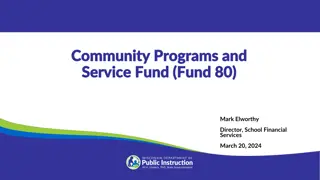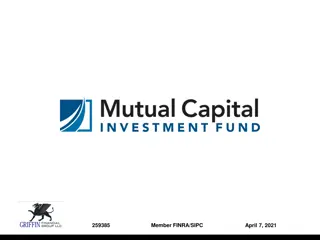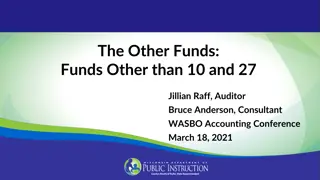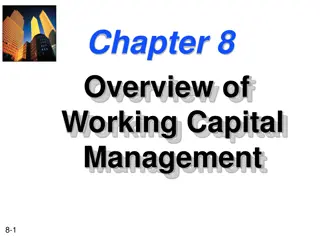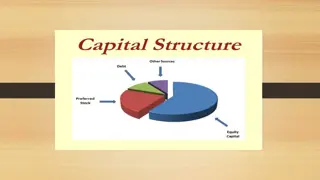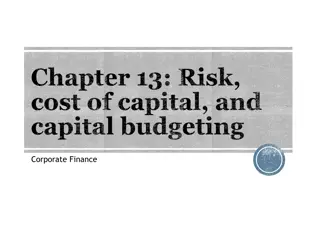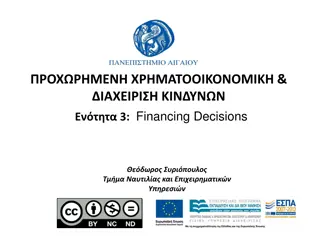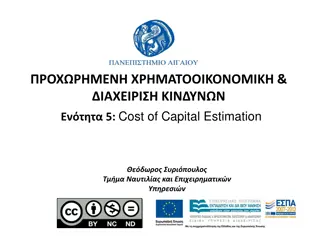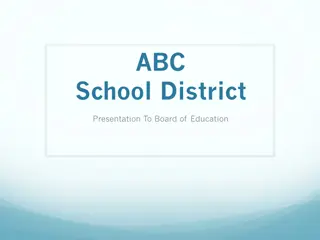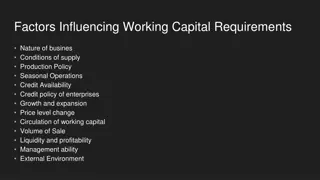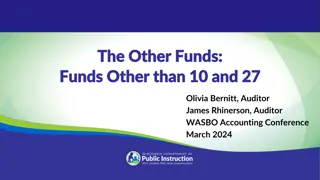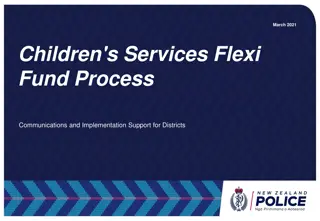Understanding the Working Capital Fund: Governance, Services, and Structure
The Working Capital Fund (WCF), established in 1944, is a fund without fiscal year limitation that supports centrally-managed Activity Centers providing various services such as Information Technology, Financial Management, and Administrative Services to USDA and Non-USDA organizations. The WCF employs an integrated governance structure for effective service delivery and financial performance, overseen by the WCF Division and an Executive Committee.
Download Presentation

Please find below an Image/Link to download the presentation.
The content on the website is provided AS IS for your information and personal use only. It may not be sold, licensed, or shared on other websites without obtaining consent from the author. Download presentation by click this link. If you encounter any issues during the download, it is possible that the publisher has removed the file from their server.
E N D
Presentation Transcript
Working Capital Fund Jorge Rivera, WCF Director Paola Felix-Rodriguez, Budget Branch Chief
Working Capital Fund.. Defined The Working Capital Fund (WCF) was established in 1944, authorized under 7 U.S.C. 2235 and is defined as: A fund without fiscal year limitation for payment of salaries and other costs for centrally managed services approved by: Public Law 78-129 (legislation creating the WCF) Secretary of Agriculture and the Director, OMB Credited with advances or reimbursements: from customers for which services are performed on the basis of rates based on estimated or actual charges for services such advances not to make available funds for any period beyond that provided by the Act appropriating the funds Providing a mechanism to avoid duplication of services among agencies.
Working Capital Fund.. Defined Cont. The WCF finances centrally-managed Activity Centers that provide support services to USDA and Non-USDA organizations and allows the Department to achieve efficiencies by engaging in economies of scale. WCF Activity Centers deliver a wide variety of services under the following functional categories: Information Technology and Data Center Services Financial Management and Human Resources Operations Administrative Services Media Communication Services Correspondence Management and Secretarial Support
WCF Governance Structure The WCF employs an integrated governance structure to ensure effective service delivery and financial performance: WCF was placed under centralized management in 1983. Day-to-day management operations are performed by the WCF Division (WCFD) under the Office of the Chief Financial Officer. The WCFD along with the WCF Controller and CFO has the overall responsibility for the financial health and integrity of the WCF. Advisory functions are carried out by a WCF Executive Committee, authorized under Departmental Regulation 1043-40, which is comprised of high-level, senior management officials who provide the CFO, working with the CIO and ASA with advice and counsel with regards to allowances for Activity Centers in WCF.
WCF Service Categories The WCF provides financial support for three categories of service: Core Services: Services characterized by two attributes non discretionary (all agencies participate) and corporate-level management (provided on behalf of USDA agencies or on a Department-wide basis) Agency-Specific Services: Services characterized by two attributes -- provided on an on-demand basis and agreement based; agencies reimburse full cost of services they order Non-USDA Services: Services provided to non-USDA agencies in a manner similar to Agency-Specific Services
WCF Budget Outlook AS USDA revamps it s operating model to achieve a more customer-focused organization, WCF activity centers have been tasked with consolidating end-user services and data centers from 39 USDA data centers to a single data center and a back-up. This move will provide a cost-effective, high quality department-wide helpdesk and reduce cybersecurity vulnerabilities.
WCF Services As a funding mechanism, WCF Activity Centers operate under different Staff Offices depending on the type of services being rendered Materiel Mgmt. Services Center Mail and Reproduction Services Integrated Procurement Systems Procurement Operations Office of the Executive Secretariat HR Enterprise System Management National Finance Center Financial Shared Services Internal Control Support Svcs. Financial Management Support Svcs. OCFO DA Digital Infrastructure Services Client Experience Center Enterprise Network Services DA Technology Center OC OCIO Creative Media and Broadcast Center
WCF vs Greenbook WCF is a reimbursement mechanism, that should not be confused with Greenbook/Shared Cost Programs : Working Capital Fund Services Greenbook/Shared Cost Programs _ Supported activities function as stand-alone business entities Supported activities serve a Departmental need (Departmental Reimbursements) or external requirement (Central Cost Distribution Programs) Costs are recovered on the basis of service demand Costs generally recovered on basis of proration (e.g., FTEs) Provides a financing mechanism for large-scale capital acquisitions Does not have a mechanism for large-scale capital acquisitions New activity centers require approval by OMB New programs require approval by Deputy Secretary Provides a mechanism for agency input (WCF Executive Committee under DR 1043-40) Employs a Shared Cost Programs Advisory Committee (under DR 2236-001)
WCF Benefits to USDA WCF provides benefits to the Department and it s agencies such as: Economies of scale Reduced overhead Central cost-based management Coordination that avoids duplication of effort among agencies Improved services to the agencies and/or the public Availability of services to agencies that could not afford them if administered by agencies independently Ability to replace equipment on a long-term basis or make investments in corporate- level systems applications through the cost recovery mechanism
Agency Reporting for WCF Services As more services are centralized at the Department level to achieve economies of scale, accurate reporting is crucial in order to have a facts-based, data-driven, decision-making, customer-focused mindset. Agencies need to properly record obligations for services received from a WCF activity center by: Obligating funds in a timely manner reflective of the appropriate period of performance Using the distinctive FMMI activity center vendor code to property identify the service provider Recording obligations using a budget object class that describes the type of services being procured Taking into consideration the metrics used by each activity center to assess cost to further allocate cost within your agency
Questions Any questions? For more information, please email us at USDAWCF@usda.gov








